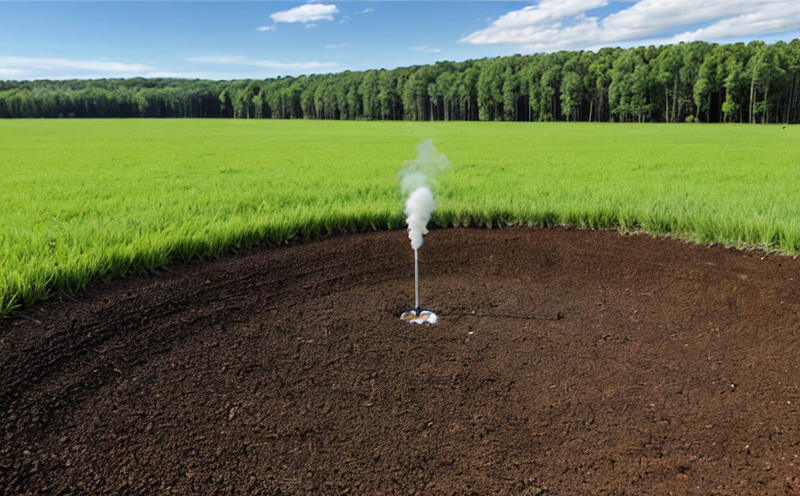ASTM D698 Soil Compaction Impact Testing in Mining Areas
The ASTM D698 soil compaction impact testing method is a critical tool used to assess the durability and performance of soils in mining environments. This standard procedure measures how resistant compacted soils are to dynamic loading, which helps predict their behavior under real-world conditions such as vehicle traffic or heavy machinery operations.
Soil compaction in mining areas can significantly influence various aspects including operational efficiency, safety standards, and environmental impact mitigation. The test involves subjecting soil samples to repeated impacts using a standardized hammer setup. By analyzing the degree of deformation after each hit, engineers gain insights into the material's resilience against mechanical stress.
Understanding these properties is essential for designing stable structures like roads, dams, and other infrastructure within mines. For instance, poor compaction can lead to premature failure or subsidence issues that could compromise safety and increase maintenance costs. Conversely, proper compaction ensures long-term stability, reduces the risk of accidents, and supports sustainable mining practices.
The ASTM D698 procedure follows precise guidelines outlined in ISO 17813:2014 for determining soil resistance to repeated loading by impact. It specifies dimensions for sample cylinders, hammer weights, drop heights, and frequency rates. Compliance with these standards ensures consistency across different laboratories worldwide.
Compliance officers must ensure their facilities adhere strictly to such protocols when conducting tests according to ASTM D698. This standardization not only enhances accuracy but also facilitates easier comparison between results from various sources. Quality managers might find value in understanding this process, as it plays a crucial role in ensuring product quality meets required specifications.
Additionally, research and development (R&D) engineers benefit greatly from familiarity with ASTM D698 since they often need to innovate solutions based on accurate data derived from these tests. They can leverage the findings to optimize design parameters or develop new technologies aimed at improving soil stability in challenging terrains.
For procurement teams responsible for selecting suppliers, knowing about ASTM D698 helps them evaluate vendors who provide compliant equipment and services related to this testing methodology. Ensuring consistency in test methods across all partners contributes significantly towards maintaining high quality standards throughout the supply chain.
In summary, mastering ASTM D698 soil compaction impact testing is vital for anyone involved in managing or overseeing mining operations. It provides a robust framework for evaluating soil properties essential for safe and efficient operations while promoting environmentally responsible practices.
Eurolab Advantages
- Accurate Measurements: Utilizing state-of-the-art instrumentation ensures precise results that meet international standards like ASTM D698.
- Comprehensive Expertise: Our team consists of highly trained professionals specializing in various testing methods relevant to mining sectors.
- Fast Turnaround Time: Leveraging advanced laboratory equipment allows us to complete tests swiftly without compromising accuracy or reliability.
- Robust Reporting: Comprehensive reports accompany every test, providing detailed analyses and recommendations based on the findings.
Customer Impact and Satisfaction
By partnering with Eurolab for ASTM D698 soil compaction impact testing in mining areas, customers experience significant benefits. Firstly, our services contribute to enhanced safety standards by ensuring that all critical infrastructure is built on stable foundations capable of enduring heavy loads over extended periods.
Secondly, compliance with international regulations becomes easier and more straightforward due to the precision and consistency achieved through our testing processes. Compliance officers can rest assured knowing their projects meet stringent requirements set forth by governing bodies worldwide.
R&D engineers gain valuable insights from our thorough analyses which enable them to refine existing designs or pioneer innovative approaches tailored specifically for harsh mining conditions. This leads to more efficient operations and potentially lower operational costs over time.
Lastly, procurement teams benefit greatly by working with suppliers who have demonstrated their ability to meet rigorous testing criteria. Such partnerships foster trust within the supply chain, leading ultimately to better collaboration between stakeholders involved in any given project.
In conclusion, Eurolab's commitment to excellence in ASTM D698 soil compaction impact testing sets us apart as a trusted partner for mining companies seeking reliable data and actionable recommendations. Our focus on quality control drives continuous improvement across all aspects of our service delivery, ultimately resulting in satisfied customers who trust us implicitly.
Use Cases and Application Examples
- Road Construction: Ensuring the integrity of roads built within mining sites to withstand traffic loads without degradation.
- Dam Stability: Assessing the stability of dam foundations to prevent potential breaches caused by excessive pressure from water or sediment.
- Mine Access Roads: Evaluating the durability of access roads used by vehicles transporting materials in and out of mines.
- Pavement Durability: Determining how well paving surfaces can withstand repeated traffic impacts without cracking or crumbling.
- Infrastructure Development: Investigating suitable locations for new mining-related infrastructure projects to ensure they are sited on appropriately stable ground.





